Songs of Enchantment Read online
Contents
About the Book
About the Author
Also by Ben Okri
Dedication
Title
Book One
1 What We Didn’t See
2 An Unwilling Adventurer
3 Dad and the Luminous Demon
4 A Bizarre Courtship
5 The Demon’s Gift
6 The Dreaming Forest
7 If You Look Too Deeply Everything Breaks Your Heart
8 Parable of the Peacock
9 The Conquest of Death
10 You Must Also Learn How to Fail
11 The Quest for Madame Koto
12 The Fore-runner
13 An Indirect Miracle
Book Two
1 The Invasion by the Future
2 Of Signs and White Antelopes
3 The Invention of Death
4 The Precious Stones of Sleep
5 Riddle of the White Antelopes
6 The Blind Old Man’s Dream: a Prophecy
7 The Serenity of the Foreseen
8 New Angles of the World (1)
9 New Angles of the World (2)
10 Dark New Age of Enchantments
11 The Masquerade’s Kingdom
12 Laughter in the Kingdom
13 The Invisible Censorship
14 Dialogue with the White Horse
15 The Perfumed Abyss
16 Madame Koto’s Dream-lust
17 Night of the Political Magicians
18 The Invention of Chaos
19 Mystery of the Butterflies
20 Fragments of the Original Way
21 How Hope Conquers Lethargy
22 The Generosity of Sorcerers
23 The Kindness of Curfew-makers
24 What Servants Reveal
25 The Music of Forgetfulness
26 The Masquerade Becomes an Invisible Censor
27 The Snake and the Shrine
28 Dark Stream of a Hidden Life
29 The Secret Truth in Hallucinations
30 Pavane for a Spirit-child
Book Three
1 A Transferred Death
2 The Battle of Mythologies
3 The Red Harvest
4 City of the Blind
5 The Secret Agony of Tygers
6 A Plague of Blindness
7 The Light of the Dead
8 A Good Man Has to Be Blind Before He Can See
9 A Day of Half-miracles
10 The Perverse Justice of the Poor
11 Into the Dead Man’s Dream
12 Manifestations of the Hidden
Book Four
1 Deliverance
2 The Freeing of One Vision Is the Freeing of All
3 Astonishing Lives in the Mirror
4 To See Anew Is Not Enough – We Must Also Create
5 The Invisible Radiance
Copyright
About the Book
One great thought can change the dreams of the world. One great action, lived out all the way to the sea, can change the history of the world. The adventures of Azaro, the spirit child, continue. From the bestselling author of The Famished Road comes this radiant sequel.
About the Author
Ben Okri has published many books, including The Famished Road, which won the Booker Prize in 1991, Songs of Enchantment, Astonishing the Gods and Dangerous Love. He has also published two books of poems, Mental Fight and An African Elegy, and a collection of non-fiction, A Way of Being Free. His most recent novel is In Arcadia, published in 2002. He has been a Fellow Commoner in Creative Arts at Trinity College, Cambridge, and is a Fellow of the Royal Society of Literature. In 2000 he was awarded an OBE for services to literature.
Ben Okri’s books have won several awards, including the Commonwealth Writers Prize for Africa, the Paris Review Aga Khan Prize for Fiction, the Chianti Rufino-Antico Fattore International Literary Prize and the Premio Grinanze Cavour. He is a vice-president of the English Centre of International PEN and was presented with a Crystal Award for outstanding contribution to the arts and to cross-cultural understanding by the World Economic Forum. In addition, he has been awarded Honorary Doctorates by the University of Westminster and the University of Essex. Ben Okri was born in Minna, Nigeria, and lives in London.
Also by Ben Okri
Fiction
Flowers and Shadows
The Landscapes Within
Incidents at the Shrine
Stars of the New Curfew
The Famished Road
Songs of Enchantment
Astonishing the Gods
Dangerous Love
Infinite Riches
In Arcadia
Non-fiction
Birds of Heaven
A Way of Being Free
Poetry
An African Elegy
Mental Fight
TO SILVER OKRI
‘felix, qui potuit rerum cognoscere causas’
Blessed are those who know the causes of things
Virgil, Georgics, Book II, 490
Ben Okri
SONGS OF
ENCHANTMENT
A Novel
BOOK ONE
1
WHAT WE DIDN’T SEE
WE DIDN’T SEE the seven mountains ahead of us. We didn’t see how they are always ahead, always calling us, always reminding us that there are more things to be done, dreams to be realised, joys to be rediscovered, promises made before birth to be fulfilled, beauty to be incarnated, and love embodied.
We didn’t notice how they hinted that nothing is ever finished, that struggles are never truly concluded, that sometimes we have to re-dream our lives, and that life can always be used to create more light.
We didn’t see the mountains ahead and so we didn’t sense the upheavals to come, upheavals that were in fact already in our midst, waiting to burst into flames. We didn’t see the chaos growing; and when its advancing waves found us we were unprepared for its feverish narratives and wild manifestations. We were unprepared for an era twisted out of natural proportions, unprepared when our road began to speak in the bizarre languages of violence and transformations. The world broke up into unimaginable forms, and only the circling spirits of the age saw what was happening with any clarity.
This is the song of a circling spirit. This is a story for all of us who never see the seven mountains of our secret destiny, who never see that beyond the chaos there can always be a new sunlight.
2
AN UNWILLING ADVENTURER
YES, THE SPIRIT-CHILD is an unwilling adventurer into chaos and sunlight, into the dreams of the living and the dead. But after dad’s last fight, after his magnificent dream, my adventures got deeper and stranger. My spirit-companions were the invisible causes of this deepening. They persisted in trying to lure me back to their realm, but now they chose another method, a method more terrifying than any they had employed before. They chose to draw me deeper into the horrors of existence as a way of forcing me to recoil from life. But they didn’t count on the love that made me want to stay on this earth. They didn’t count on my curiosity either.
It took dad a long time to recover from his mythic battle with the man from the Land of Fighting Ghosts. He became withdrawn, and something about him changed irrevocably. After dad’s fight, and after the good wind stopped blowing, a new cycle launched itself into our universe.
In those days it didn’t rain, but I didn’t go to school any more. I stopped because even at school my spirit-companions tormented me. Their songs distracted and confused me, and when I copied down the wrong things I got into trouble. There was a history class, for example, in which the teacher was horrified to find my exercise book covered in complex mathematical equations. I didn’t know
where they had come from. When we were being taught mathematics under a dying silk-cotton tree the face of a penitent oppressor of our people stared at me from the trunk. On one day I saw the radiant face of Pharaoh Akhnaton, on another the faces of the unborn. When I stared at them, mesmerised, the teacher flogged me for not paying attention. In the English class my spirit-companions sang polyphonic chorales at me in a blending of seven traditional languages. It became impossible to concentrate. There were even times when the spirits whispered things in my ears and I blurted out what the teacher was going to say moments before he did. The worst thing was that I seemed to know our examination questions before they were set, and I knew the answers as well. The teachers found this very peculiar. Suspicious of the accuracy of my answers, they often failed me because they thought I had been cheating.
In short, my spirit-companions played havoc with my education. They made me seem strange to the other children, and so I didn’t have many friends. There was only Ade, but he was succumbing to the world of spirits. His epileptic spells were luring him away from life. I was often lonely. And my spirit-companions used my loneliness to invade my life in new ways. They expanded my being and filled me with mysterious spaces. They insinuated themselves into my vision. In the midst of my new solitude, and particularly at night when I was asleep, they frequently read to me from invisible books of history, science, philosophy, musicology and geography. They poured all manner of arcane knowledge into my head. They filled me to bursting with spirit books of literature, archaeology, quantum physics and advanced lessons in counterpoint and chiaroscuro long before I could even read. They filled me with images of Zimbabwean rock paintings and Nordic gods, with Luo proverbs, Ashante songs, and Byzantine melodies, with Zulu epics and stories of ancient, forgotten heroes. All this made me babble out the strangest things and made my teachers hate me. Tired of being singled out for merciless whipping, I took to sneaking from class and wandering through the ghetto.
Yes, those relentless spirit-companions of mine poured into me the prophecies of Nostradamus and the wild visions of African mystics and the theories of Pythagoras and hundreds of useless facts. Meanwhile I walked barefoot in a world breaking down under the force of hunger. Meanwhile I staggered beneath the demonic smile of the yellow sun which sets bushes and newspapers alight.
3
DAD AND THE LUMINOUS DEMON
THEN ONE MORNING, more golden than yellow, my wandering found a focus. I went outside to our housefront and saw that the beggars had gone. They had come uninvited to the party dad threw to celebrate his great victory, and he absorbed them into his mythology and set himself up as their champion. He promised to build them a school. But we had been so concerned with dad’s recovery that we stopped noticing the beggars, and forgot their special place in dad’s political vision. And because we forgot them, they turned against us. Dad had great plans for them. Now they had disappeared. It was with some anxiety that I looked for them everywhere.
I scoured the street and asked everyone I met. I went to Madame Koto’s barfront. I searched for them along the edges of the forest, where they scavenged for food and slept in unfinished houses, but I simply couldn’t find them.
Late in the afternoon when dad returned from work, reeking of the bags of fish he had been carrying on his head all day, I told him that the beggars had gone.
‘Gone?’ he asked incredulously. ‘How can they go? I’m going to build them a school. I’ve even started asking about the cost of a plot of land. They haven’t really gone, have they?’
‘They have,’ I said.
Stinking of fish, his forehead glistening with iridescent scales, his boots thick with mud, he bustled out into the street and went looking for the beggars. He didn’t even stop to change from his work clothes. I hurried out with him. Great energies swirled around dad. His spirit was fiery. He walked with enormous strides and I tried to keep up with him as he erupted into a torrent of fantastical ideas and schemes. He was going to build a unique school for beggars. He was going to supervise the education of all poor and illiterate people. He said they needed education the most.
‘That is how the powerful people keep us down,’ he maintained. ‘They keep us illiterate and then they deceive us and treat us like children.’
He swore that he was going to teach the beggars mathematics, accountancy, law and history. He said I would teach them how to read. He talked of turning all the ghettoes into special secret universities where the most effective knowledge in the world would be made available.
We went up the street and got to the main road. Crowds of people all over the place were talking about politics. They talked about the forthcoming rally and the famous musicians who would be performing. And they also talked about those who had died in the political violence. We happened to notice a few beggars up the road and dad went and spoke to them as if they were old friends. I heard him asking one of them about Helen, the beautiful beggar girl with a bad eye. I heard him pleading with them to come back to our street and help with the building of the school. He was so fervent and earnest that he must have struck everyone as being quite mad. The beggars were frightened by him, and they fled. Dad went after them, pleading, and they kept running: they must have thought that he was trying to steal what little money they had. Exasperated, dad turned to me and said:
‘What’s wrong with them? Why are they afraid of me, eh?’
‘They are not the same beggars.’
‘Not the same beggars?’
‘These are different beggars. They are not the ones from our street.’
Dad glared at them. Then he said:
‘Let’s go back.’
We pushed through the crowds, past bicyclists ringing their bells, cart-pullers groaning with their loads of garri and cement, past the tight throng of traders and marketwomen. At the arena where the great rally was going to be staged carpenters were constructing a mighty dais with a zinc roof. Hundreds of artisans were working at the site, hammering away, sawing up wood, climbing up ladders, carrying thick planks, singing, shouting and arguing. Petty traders sat around selling soft drinks and ready-made food. Dad met some of his fellow load-carriers and engaged them in lengthy political disputations. And when we got back to our street we were astonished to find our beggars sitting round the broken vehicle, as if they had been there all along, and as if we had just re-entered their alien reality. Helen wasn’t with them.
The beggars looked at us with dull eyes. They didn’t move from their positions and their faces didn’t light up at the sight of dad. It was clear that they had reached a decision. Dad felt excluded from the closed circle of their resolution, and he tried to regain their trust, and inspire them with his lofty schemes. But they had heard his promises a thousand times and their faces registered no response. He joked, and laughed at his own jokes, but they remained sullen. He asked about Helen, but they made no reply. He became unaccountably desperate.
‘Where has she gone? Has someone touched her? Did she run away? Has she deserted our cause?’
The beggars were silent. Dad stared at them for a long time, apparently confused. Then, muttering something, he hurried back to the house. I went after him. When I got to the room, he was taking off his boots. He told me to polish them till they shone. He went and had a bath and washed the fish smells off him.
While he bathed, mum returned from her day-long hawking of cheap wares. She seemed leaner, her eyes dulled by the yellow dust, her face darkened by the fiery marigold sunlight. After dropping her basin of provisions on the cupboard, she sat on the bed. She did not move. She did not speak. She stank of profound exhaustion.
When dad came in from the bathroom he did not seem particularly pleased to see mum. In fact, he ignored her altogether. He sat on his chair and proceeded to anoint himself with coconut oil. He combed and parted his hair. Then he put on his safari suit which used to be white, but which had turned brownish with age. He applied cheap perfume to his face. Something odd had happened to dad after his great d
ream. He had become more susceptible to invisible presences in the air. It was as if holes had opened up in his spirit through which wisps of malevolence could enter.
When he saw that his boots had not been cleaned or polished, he exploded into a short burst of rage. He chased me twice round the room with a thick belt in his hand. He caught me at the door, dragged me in, and was about to lash me when mum – in a deadly voice – said:
‘If you touch my son, you will have to kill me.’
Dad lowered his belt and sat in his chair. He retreated into the barely contained whirlwind of his fury. He poured himself a generous quantity of ogogoro, lit a cigarette and, in between smoking, proceeded to decrust his boots. While he cleaned his boots his spirit boiled and I watched as a strange demon entered him in the form of a beautiful girl with green eyes. The demon-girl moved into dad’s spirit and sat comfortably, and then I couldn’t see it any more. As he cleaned his boots with fiery vigour, smoking his cigarette with a grim intensity, his spirit rising and swirling, dad lashed us with accusations. Sweating through his suit, his temper seemed to burn around him. His forehead became an agitation of wrinkles. Mum sat very still, listening. While dad was shouting at us an evil spirit went right through our room, on its way to the preparations for the great political rally. The evil spirit, passing through our spaces, made all of us edgy. It awakened deep irrational passions in dad’s brain. Fuming, he scraped the dried mud off his boots angrily. His face swelling, his chest heaving, his big muscles bristling, he accused us of betraying him, of not caring enough for his ideals. Mum, he said, only cared for herself. He complained that we had no respect for him, that we didn’t even see the importance of carrying on his schemes while he recovered from his fight.
He harangued us as if we were failed members of a government cabinet. He was angry about the fact that we had not supervised the beggars, had not encouraged them, had not fed them, and had not looked after Helen, the beggar girl, whom he said was a princess from a distant and devastated kingdom. He rounded on me because I had stoped spying at Madame Koto’s bar. He rounded on mum because she had not been keeping in touch with political developments, and had done nothing to recruit women to his political party. And he turned on both of us for failing to keep alive his dream of a university for beggars and the poor.

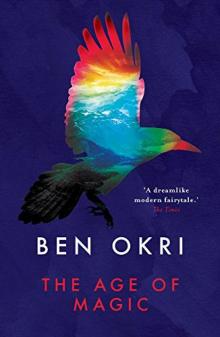 The Age of Magic
The Age of Magic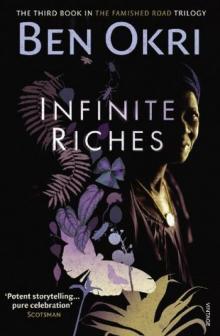 Infinite Riches
Infinite Riches Songs of Enchantment
Songs of Enchantment Tales of Freedom
Tales of Freedom Dangerous Love
Dangerous Love Starbook
Starbook The Famished Road
The Famished Road Astonishing the Gods
Astonishing the Gods A Fire in My Head
A Fire in My Head The Freedom Artist
The Freedom Artist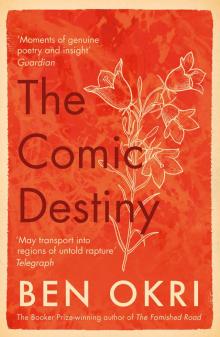 The Comic Destiny
The Comic Destiny A Way of Being Free
A Way of Being Free Prayer for the Living
Prayer for the Living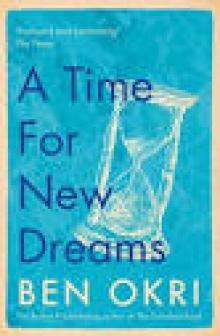 A Time for New Dreams
A Time for New Dreams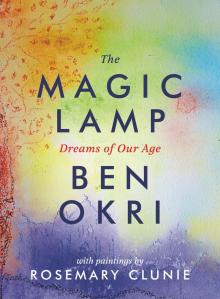 The Magic Lamp
The Magic Lamp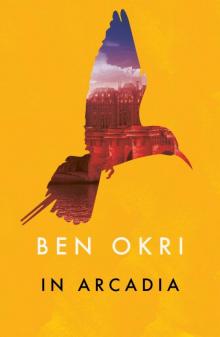 In Arcadia
In Arcadia